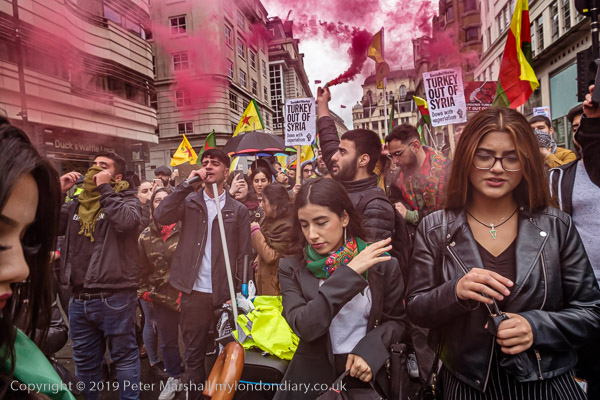
One of the things that makes it hard to leave London is the diversity of the communities that have made their homes here, making this an exciting place. Throughout its history Britain’s population has been enriched by immigration and although immigrants have not always been made welcome they have made a very positive contribution to our society. Among them have been many religious and political refugees and asylum seekers, and many continue to support the causes in their home countries while in London.
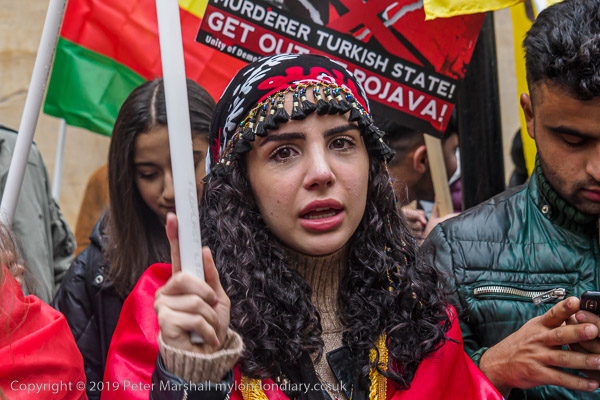
While our media generally give little attention to protests – except for those rare occasions involving individual violent acts or anti-establishment acts such involving insults against national heroes such as the writing of graffiti on the plinth of the Churchill statue or attacking statues of slave traders, the protests by ethnic communities against events in their home countries are almost entirely dismissed as what one newsroom at least refers to as “tribal matters”.
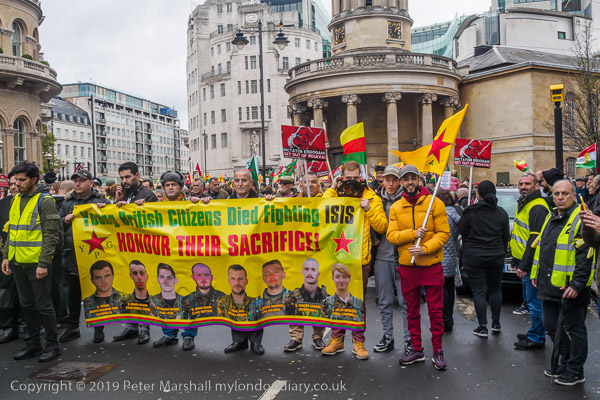
Of course they are wrong, as well as being xenophobic. We live in a world that is increasingly interconnected and globalised, and Brexit, taking us out from under the wing of Europe will give even more importance to events happening around the rest of the world, including Rojava, Ecuador and Bolivia.
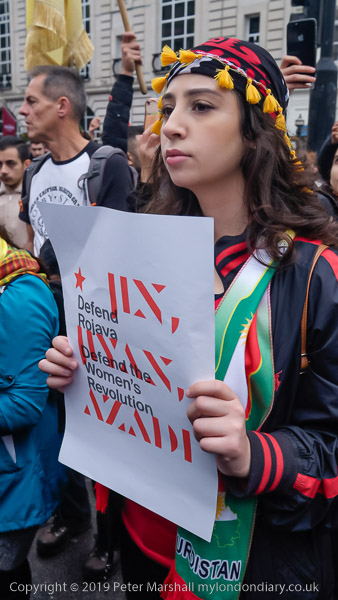
Rojava is important not just to those who live in this Kurdish-controlled part of Syria and to Kurds in general but the rest of us around the world. It was the Syrian Kurds who with US air support who were able to defeat ISIS but as a model of a democratic system dedicated to equality, the liberation of women and ecological justice that could serve to provide the system change we need to overcome climate disaster and to resolve the problems of the middle east and elsewhere.
After ISIS were defeated, Trump brought US forces out of the area, leaving it open for Turkey to advance into Syria – with the aid of Islamist forces and the aim of destroying the Kurds. Through NATO we give Turkey support and doubtless supply arms while Russia, backing President Assad are happy to see Syrians who don’t support him exterminated. The Turks have huge superiority in weapons and seem very likely to acheive their aims, but are then likely to establish an Islamic state in the area rather than withdraw back to Turkish territory and we could well then see a war between Russia and NATO forces.
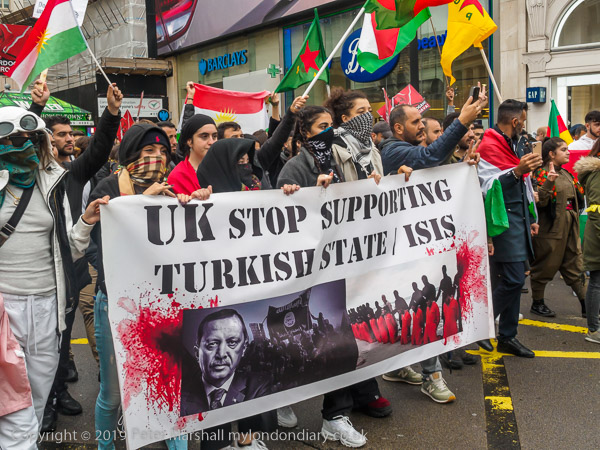
If you rely on the BBC for your news you will know probably know very little about what is going on in northern Syria and the protesters, mainly Kurds but with some support from the British left, gathered outside Broadcasting House a year ago today on Sunday October 13th 2019 to condemn the poor BBC coverage and hope to persuade them to do more. I met them there and marched with them as far as Trafalgar Square; they went on towards Parliament but I stopped to cover two other protests over events abroad.
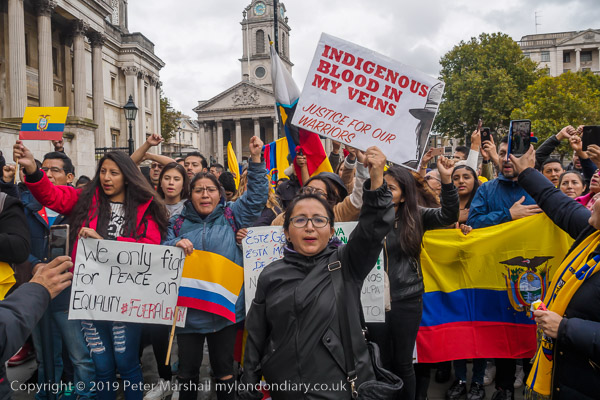
Ecuadorians living in the UK had come to call for the resignation of President Lenin Moreno who they say is their worst president ever. Many there were from indigenous groups who have been hardest hit by public service cuts, particularly the ending of fuel subsidies. Protests had been causing chaos in the capital Quito since these were announced two weeks earlier. The austerity measures had been demanded by the International Monetary Fund in order for the country to get a £3.4bn loan. After Brexit we could well see Britain having to meet similar IMF demands whose aim is to protect and promote international capital and corporations at the expense of the poor.
As the Ecuadorians left they were replace by Bolivians who held a lively rally with music and dancers in support of President Evo Morales, who was seeking a fourth term in elections a week later on 20 October.
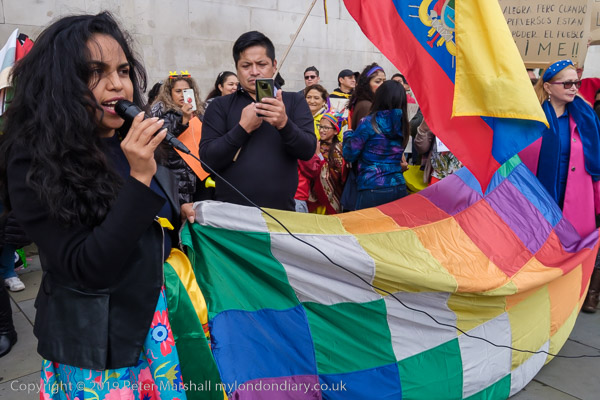
Morales, the first Indigenous president, and his Movement for Socialism (MAS) greatly reduced poverty, cut the influence of the USA and multinational companies and made Bolivia a model of economic growth. Although popular among the poorer citizens, his policies had not endeared him to the wealthy or to the United States.
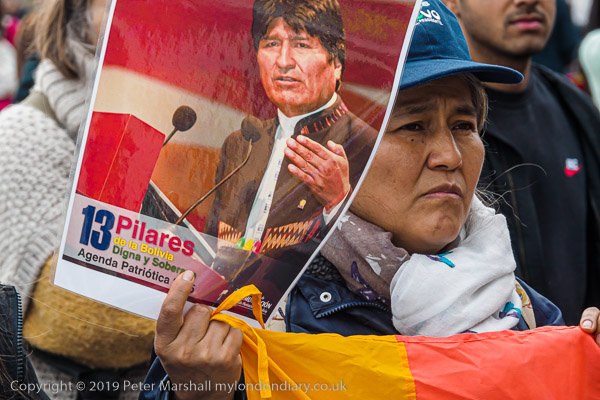
Although the election results made Morales a clear winner, with just enough votes to win on the first round, it was followed by violent insurrection amid claims of electoral fraud. Morales fled the country and resigned as President claiming there had been a coup after armed intruders broke into his home. He was offered political asylum first in Mexico and later moved from there to asylum in Argentina.
Although an Organization of American States investigation found there had been voting fraud, later studies by US political scientists and experts on Latin American politics concluded there was no statistical evidence of fraud. Despite being voted in by the Bolivian people, a warrant was issued in December for the arrest of Morales on charges of sedition and terrorism.
More about the three protests on My London Diary:
Rally supports Bolivia’s Evo Morales
Against Ecuadorian President Moreno
Solidarity with Rojava – Kurdish Syria
All photographs on this and my other sites, unless otherwise stated, are taken by and copyright of Peter Marshall, and are available for reproduction or can be bought as prints.